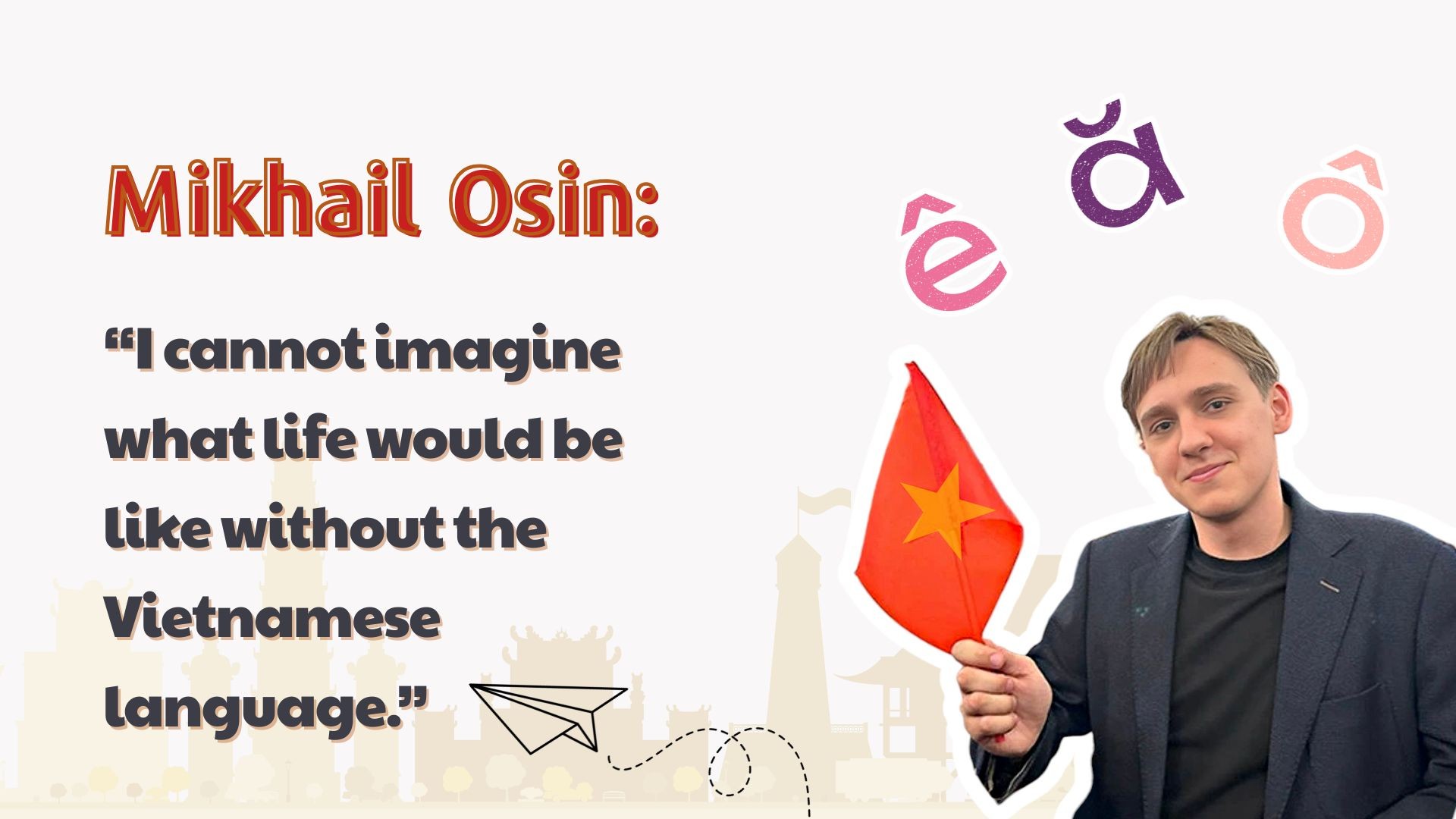 |
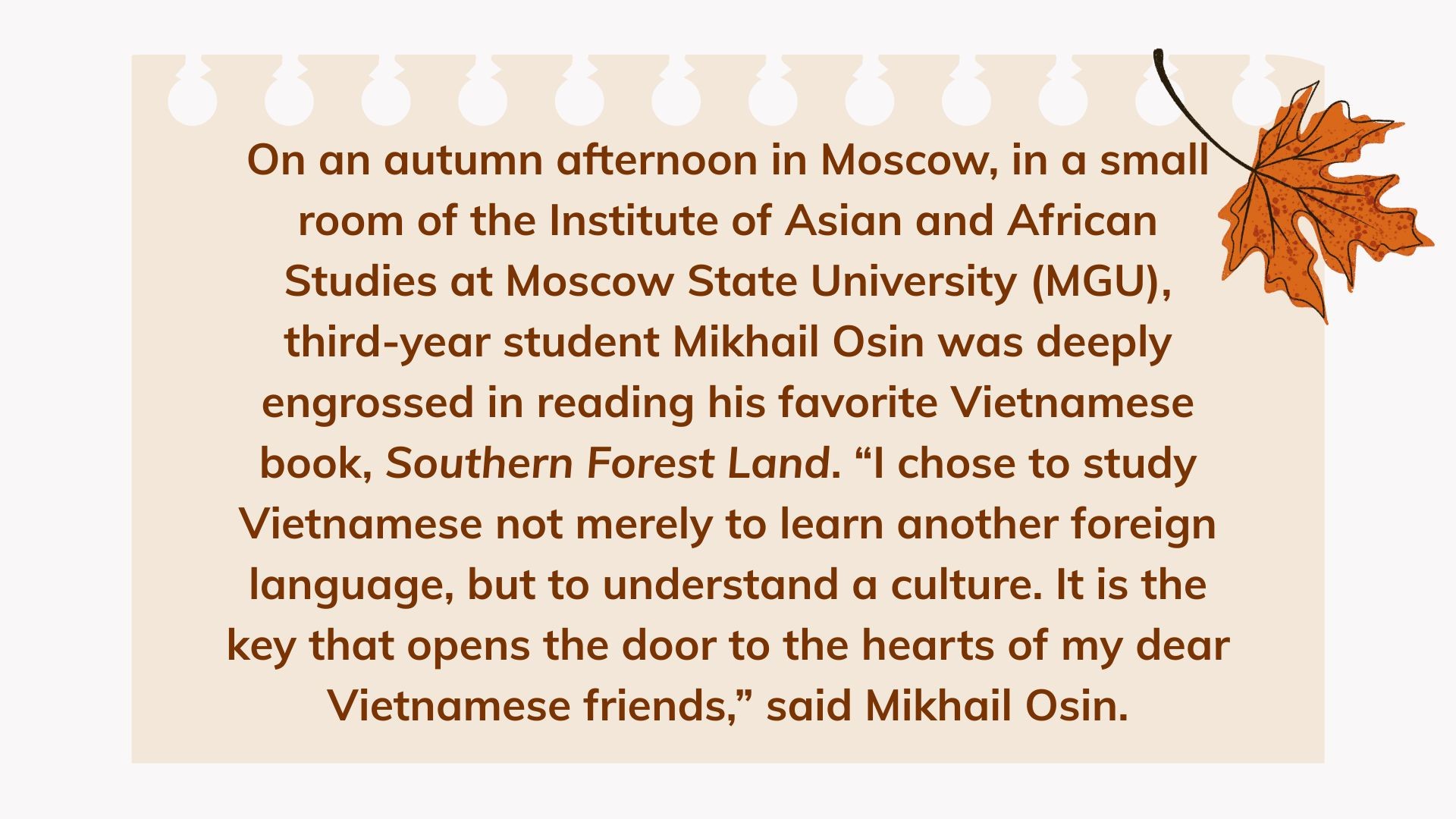 |
 |
| In late September 2025, during the final night of the Intervision International Music Contest, social media was flooded with congratulatory messages for Mikhail Osin — the interpreter for the Vietnamese delegation. Throughout the competition, audiences witnessed a young Russian man who not only translated accurately and sensitively, but also conveyed a deep appreciation of Vietnamese culture in every word and every smile. |
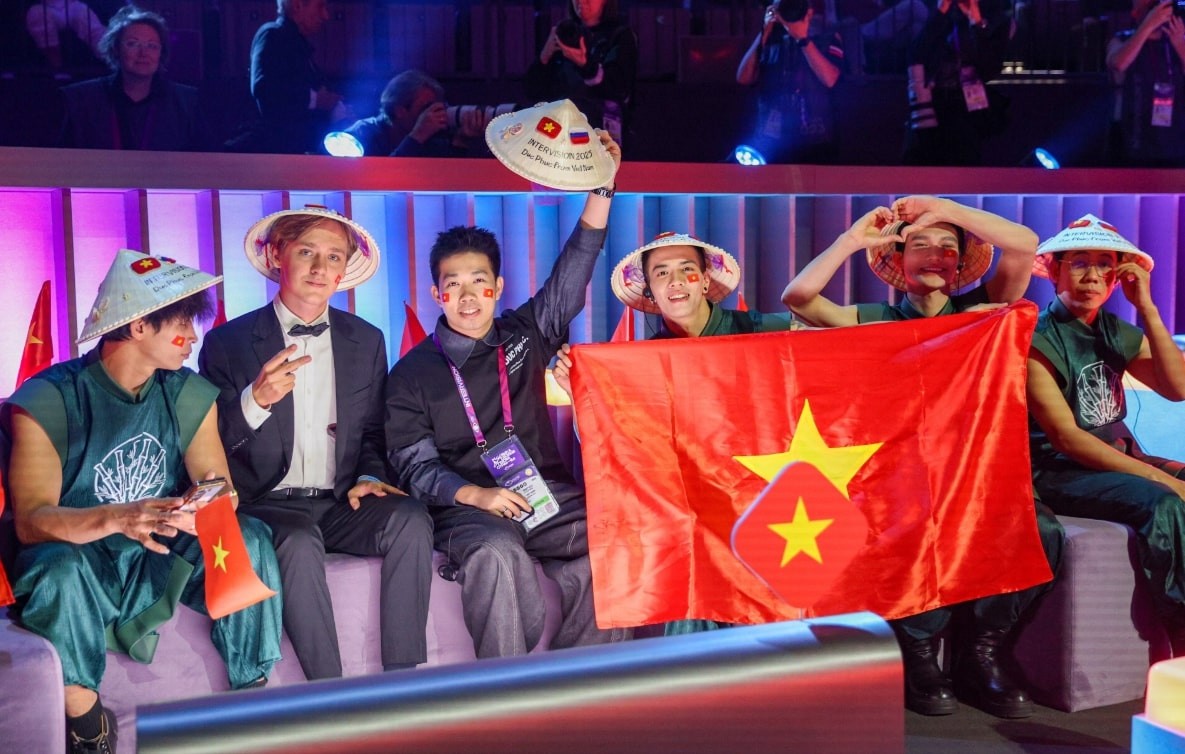 |
| Mikhail Osin (second from left) serves as the interpreter for the Vietnamese delegation at the Intervision 2025 competition. |
|
Mikhail Osin was born and raised in Moscow, the capital of the Russian Federation. From an early age, he developed a fondness for Asian cultures, fascinated by their uniqueness, distinctive way of life, and deep respect for tradition. Mikhail realized that few people paid attention to Southeast Asian languages - a region rich with its own “hidden gems.” In 2022, he began learning Vietnamese. “Vietnamese has tones that sound almost like singing. At first, I thought it was very difficult, but the more I studied, the more fascinating it became,” Mikhail shared. Mikhail’s family played a major role in his decision to pursue Vietnamese. Before applying to university, he sought his father’s advice. Without hesitation, his father said, “Misha, you should learn Vietnamese - you definitely won’t regret it. Vietnamese people are cheerful and friendly. When I was young, I met some Vietnamese, and they left a deep impression on me.” Those words became a turning point in Mikhail’s academic journey. Without overthinking, he filled out his university application and wrote down only one choice - the Vietnamese language major. “To this day, I have never once regretted that decision!” Mikhail affirmed. He added, “I love the Vietnamese language, its culture, and its people. In the next two years, I hope to continue improving my language skills, support my Vietnamese friends when they come to Russia, and after graduation, I plan to return to Vietnam to start my career. I may not be able to go back right now, but I believe fate will lead me there.” |
 |
| Mikhail Osin interprets for Vietnamese singer Duc Phuc during the interview segment of the Intervision 2025 final night. |
| There is a Russian saying: “He who knows a language can travel the world.” For me, Vietnamese is the key that opens that path. The most precious lesson I learned after Intervision 2025 is the power of language in connecting people. I love the Vietnamese language and enjoy sharing stories about Russia with my Vietnamese friends. I believe that is the most beautiful form of “people-to-people diplomacy.” |
 |
|
Vietnamese and Russian differ greatly in grammar, tone, and cultural nuances. When he first began learning, Mikhail had to get used to the tonal system and the Vietnamese way of thinking. He was amazed to discover that simply changing a tone could completely alter a word’s meaning. “Encountering the unique structure of the Vietnamese language was an entirely new experience,” Mikhail marveled. “Every day I attend Vietnamese class, I grow even more admiring of its richness, subtlety, and distinct beauty,” he shared. Mikhail vividly remembers the excitement of sitting at his desk, carefully writing each new word into his notebook and trying to grasp the logic of the language. He felt pure joy with every small step of progress — especially the first time he managed to say a few sentences in Vietnamese. |
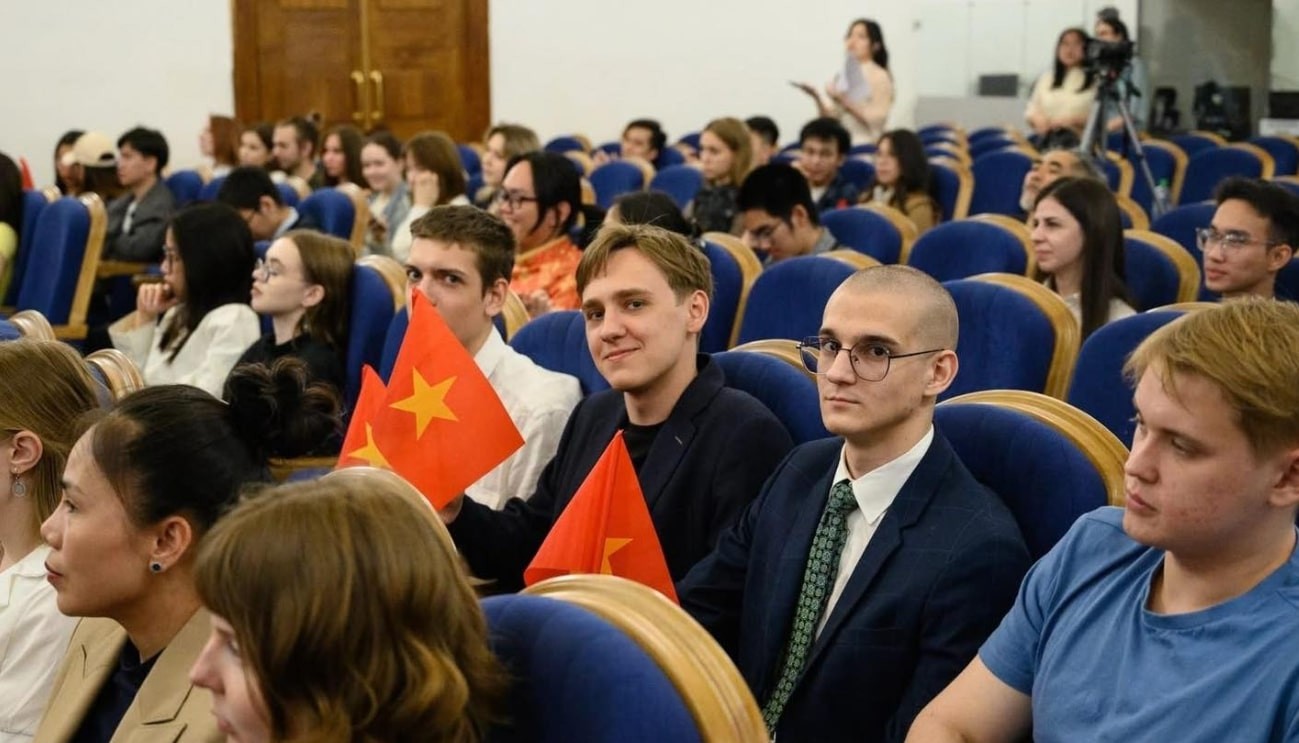 |
| Mikhail Osin takes part in the “Vietnamese Culture Day” at Moscow State Linguistic University (MSLU). |
|
“When I first said in the Vietnamese club, ‘I am a student. I study at the university,’ and everyone understood me, I felt as if I had just flown into space. In fact, at that time, I could hardly understand what others were saying - the words seemed to run together - but I saw it as a challenge I had to overcome.” “Once I chose to study Vietnamese, I knew I had to put in my best effort so that I would never regret my decision. The small joys of recognizing familiar words on product packaging, in Vietnamese restaurant menus, or when I happen to understand something written in Vietnamese online — those moments give me the motivation to keep learning,” the Russian student shared. No matter how busy he is, Mikhail always tries to spend at least two extra hours a day studying on his own. In the evenings, he often sits down to do additional exercises, believing that a language can only be mastered through regular use. Each time he learns a new word, Mikhail immediately applies it by writing short paragraphs, doing translations, or composing sentences to fully grasp its usage. For Mikhail, exploring culture is an inseparable part of learning. Every day, he reads news about Vietnam, learns about daily life there, and combines his studies with his personal interests. |
|
Mikhail Osin takes part in cultural activities in Vietnam. |
|
“I love art and art history, so I often explore Vietnamese lacquer paintings and traditional art styles. I also have a great passion for music. I frequently listen to Vietnamese songs, read the lyrics, and translate them into Russian to better understand their meaning. To me, that’s also an incredibly effective way to practice the language,” said Mikhail Osin. In Russia, there are many Vietnamese language clubs at universities. Mikhail regularly joins these clubs and has made many Vietnamese friends. They help him with pronunciation, while he helps them learn Russian. At first, memorizing such a large amount of vocabulary was quite challenging for Mikhail, and there were moments when he even thought about giving up and switching to another language that was easier to use in Russia. It was then that his teachers suggested he join a one-year student exchange program in Vietnam — a trip that greatly improved his communication skills. |
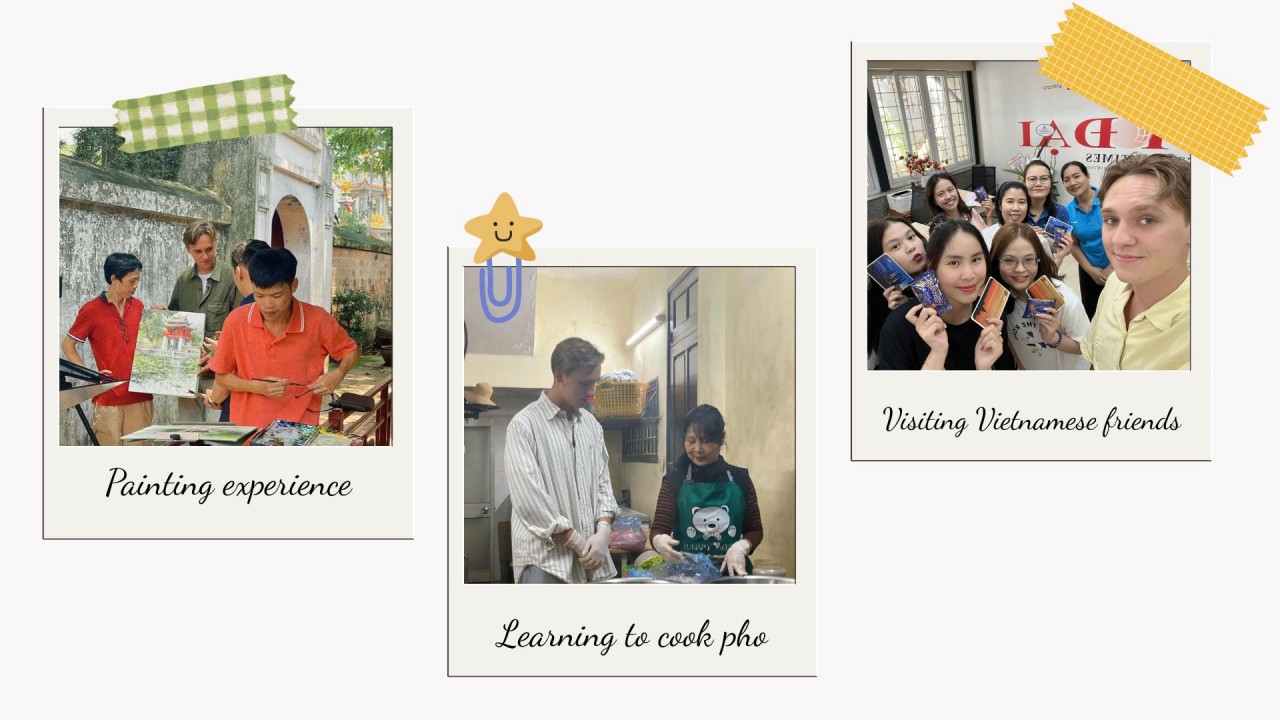 |
|
“When I came to Vietnam, I set a rule for myself: no English. Even when people spoke to me in English, I always replied in Vietnamese. I thought, if I’m already in Vietnam, I must practice Vietnamese,” said Mikhail Osin. On May 23, at Moscow State Linguistic University (MSLU), Russia, a “Vietnamese Culture Day” was held, jointly organized by Vietnamese and Russian students. Mikhail took part in the event and shared: “I have participated in almost every Vietnamese Culture Day organized at different universities in Moscow, and I believe such events are very important for promoting the traditional friendship between Russia and Vietnam. Joining these programs gives me the chance to meet and interact with Vietnamese students, as well as to learn more about Vietnamese culture.” |
 |
| Recently, Mikhail decided to step out of his comfort zone and challenge himself in the field of translation. In September 2025, he took on the role of interpreter for the Vietnamese delegation participating in the Intervision International Music Contest in Moscow. |
|
At first, a few of Mikhail’s friends only asked him to serve as a temporary interpreter during meetings between producers. The large amount of technical vocabulary made the job far from easy. Nevertheless, Mikhail managed to handle it well and fulfill his responsibilities. What impressed him most was the special bond within the Vietnamese delegation. Every time he had the chance to talk and work alongside them, Mikhail was struck by their combination of professionalism and warmth. |
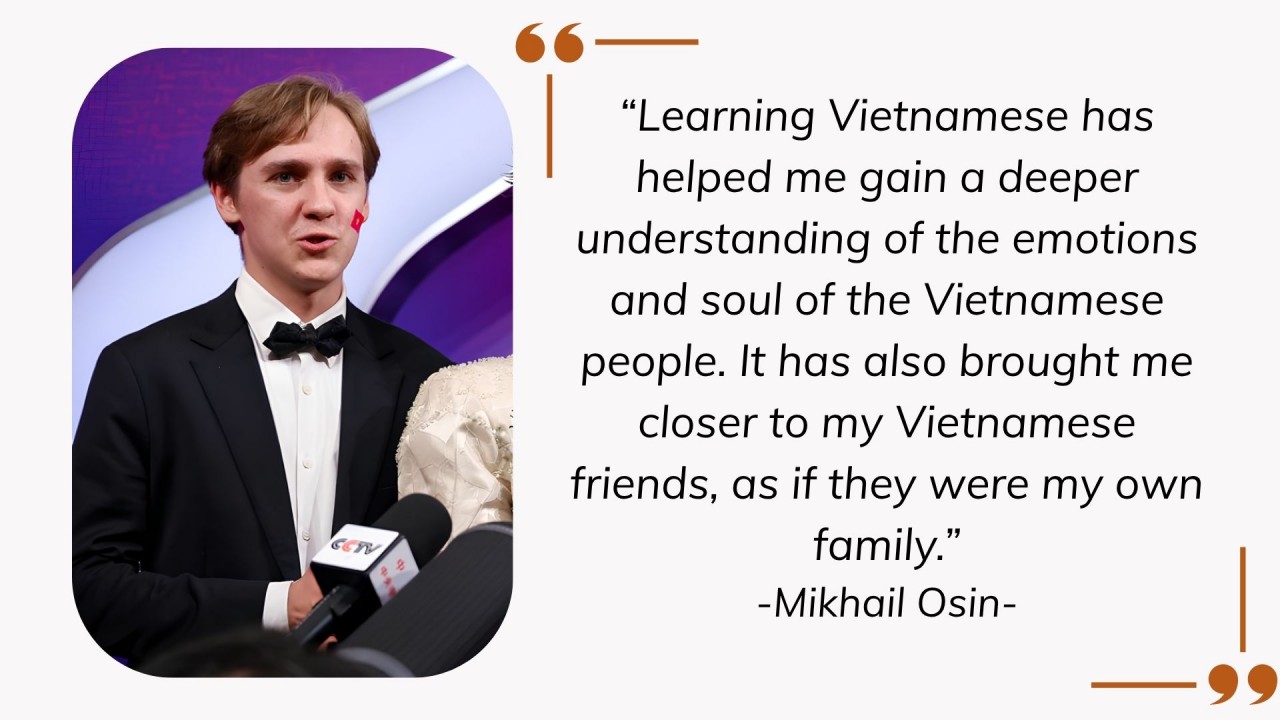 |
|
After graduation, Mikhail plans to continue his studies in Vietnamese Studies, hoping to become a bridge between the Russian and Vietnamese peoples and help Russians gain a deeper understanding of this beautiful country. “I hope to have the opportunity to take part in more cultural promotion projects and to work in Vietnam. Even if I don’t work directly in Vietnam in the future, my life will always be connected to this country. I have many close Vietnamese friends who consider me part of their family. I’ll keep returning to Vietnam to visit them, travel, and enjoy the familiar atmosphere,” Mikhail shared. As the late afternoon sunlight streamed through the window, Mikhail sat with his Vietnamese book, reading each line attentively. Amid distant Moscow, the sound of the Vietnamese language resonated warmly, like an invisible thread connecting him to the country he loves. “Now, I can’t imagine what life would be like without Vietnamese. I have to live with it, as with a part of my own heart,” said Mikhail. |
|
By: Bach Duong Published on: October 29, 2025 |